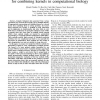Free Online Productivity Tools
i2Speak
i2Symbol
i2OCR
iTex2Img
iWeb2Print
iWeb2Shot
i2Type
iPdf2Split
iPdf2Merge
i2Bopomofo
i2Arabic
i2Style
i2Image
i2PDF
iLatex2Rtf
Sci2ools
153
click to vote
RIVF
2008
2008
Simple but effective methods for combining kernels in computational biology
Complex biological data generated from various experiments are stored in diverse data types in multiple datasets. By appropriately representing each biological dataset as a kernel matrix then combining them in solving problems, the kernelbased approach has become a spotlight in data integration and its application in bioinformatics and other fields as well. While linear combination of unweighed multiple kernels (UMK) is popular, there have been effort on multiple kernel learning (MKL) where optimal weights are learned by semi-definite programming or sequential minimal optimization (SMO-MKL). These methods provide high accuracy of biological prediction problems, but very complicated and hard to use, especially for non-experts in optimization. These methods are also usually of high computational cost and not suitable for large data sets. In this paper, we propose two simple but effective methods for determining weights for conic combination of multiple kernels. The former is to learn opt...
Related Content
| Added | 30 Oct 2010 |
| Updated | 30 Oct 2010 |
| Type | Conference |
| Year | 2008 |
| Where | RIVF |
| Authors | Hiroaki Tanabe, Tu Bao Ho, Canh Hao Nguyen, Saori Kawasaki |
Comments (0)

